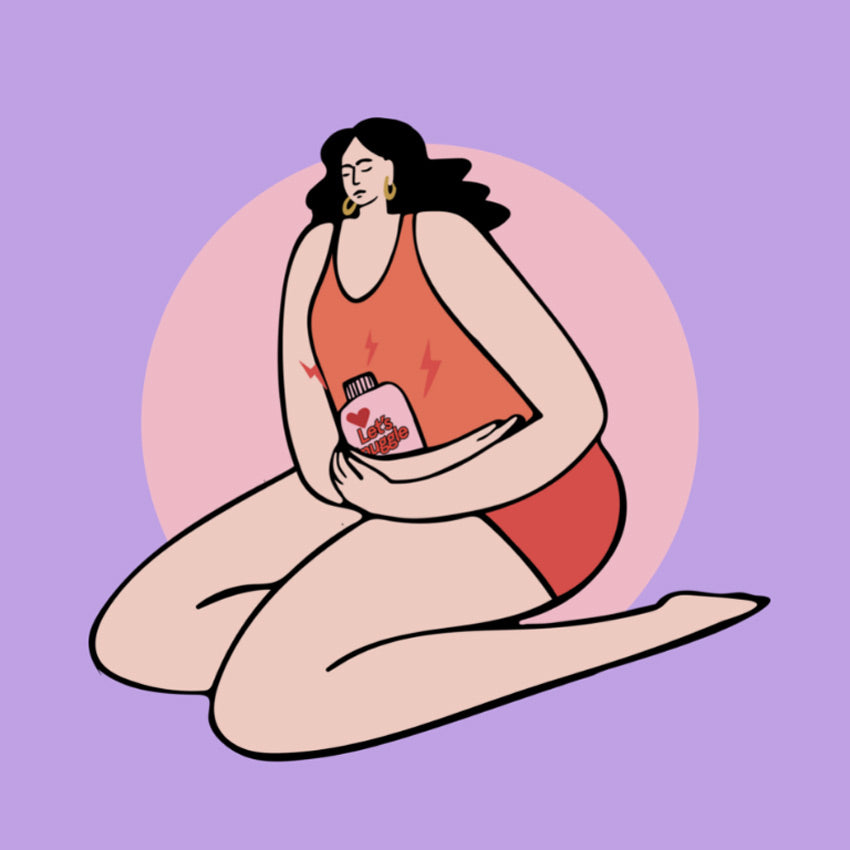What is postmenstrual syndrome & its symptoms?

Image by Janosch Lino via Unsplash.
WHAT IS POSTMENSTRUAL SYNDROME?
Postmenstrual syndrome is a phase that follows your menstrual period (i.e. the bleeding phase of your cycle), bringing with it a unique set of physical and emotional symptoms. Unlike Premenstrual syndrome (often referred to as PMS), which occurs before your period, Postmenstrual syndrome emerges after your period has ended.
Whilst around 90% of women experience PMS, it's believed that only 10% of those who menstruate experience Postmenstrual syndrome - though it is said to be a newer term in the medial field, and a syndrome that was previously considered a myth. As it becomes more widely accepted and understood, this figure may increase (we'll be sure to keep you updated as we learn more!).
HOW LONG DOES POSTMENSTRUAL SYNDROME LAST?
Postmenstrual syndrome symptoms usually only last a few days after your period but in some cases, it can last up to two weeks.
WHAT ARE THE SYMPTOMS?
The symptoms of Postmenstrual syndrome can be similar to those of PMS, but often those related to Postmenstrual Syndrome may be more intense.
These symptoms can vary from person to person, and not everyone experiences the same ones. The key is recognizing these signs after your period has bid adieu, as they're the telltale signs that Postmenstrual syndrome might be dropping by for a visit.
FATIGUE
Ever feel like you've run a marathon when you've barely left your couch? Fatigue during Postmenstrual syndrome can zap your energy, leaving you feeling like you need a nap ASAP. The fluctuations in the hormones estrogen and progesterone are the culprits here.
ANXIETY
Fluctuating estrogen and progesterone affect neurotransmitters like serotonin, triggering heightened anxiety or exacerbating existing feelings. Emotional swings and hormonal shifts create a perfect storm for increased worry and unease and some people might experience mood swings.
SLEEP DIFFICULTIES
Hormonal changes post-period can unsettle your body's internal clock, leading to restless nights. Symptoms like mood swings or physical discomfort can further impact sleep quality.
BLOATING
It's that uncomfortable feeling where your clothes suddenly feel a size too small, almost overnight. Bloating during this phase isn't uncommon, caused by fluctuating levels of estrogen and progesterone that affect fluid retention and digestion. Increased water retention and slowed-down digestion contribute to this bloating sensation, often accompanied by gas and discomfort.
HEADACHES
Estrogen's decline can trigger headaches, especially migraines, due to its role in regulating pain perception. Stress, disrupted sleep, or other Postmenstrual syndrome symptoms like fatigue can also exacerbate headaches during this time.
Other symptoms may include pain in the joints or back, vaginal dryness or even discomfort during sex. If you're having trouble with any of these, check in with your GP.
ARE THERE LINKS TO POSTMENSTRAL SYNDROME AND PCOS?
Postmenstrual syndrome (POMS) and Polycystic ovarian syndrome (PCOS) are distinct conditions but share some overlapping symptoms. While POMS occurs cyclically post-menstruation, PCOS involves hormonal imbalances causing irregular periods, excess androgen levels, and cysts on the ovaries. Both may feature mood swings, fatigue, and irregular periods, but PCOS includes additional issues like weight gain, acne, and fertility challenges. POMS symptoms often subside after menstruation, while PCOS symptoms persist. Despite similarities, their causes and long-term implications differ, requiring specific diagnostic approaches. Consulting a healthcare professional helps differentiate and manage these conditions effectively.
HOME REMEDIES TO HELP WITH POST MENSTRUAL SYNDROME
There are simple changes you can make to your everyday life choices that may help alleviate the symptoms of Postmenstrual syndrome, including:
AROMATHERAPY
Scents and essential oils like lavender, chamomile, or clary sage may help to reduce stress, ease mood swings, and promote relaxation, offering potential relief during this phase. (Our go-to is a room mist diffuser).
MEDITATION
Practice relaxation techniques such as deep breathing, meditation, or mindfulness to help manage anxiety, mood swings and stress levels.
SWITCH UP YOUR MENSTRUAL PRODUCTS
Switching menstrual products, like opting for organic cotton pads or tampons, or using a menstrual cup made from medical-grade silicone, may potentially help to alleviate Postmenstrual syndrome symptoms. Chemical/fragrance free and breathable materials like certified organic cotton may help reduce skin irritation and exposure to synthetic substances, potentially minimizing discomfort and allergic reactions that are often associated with synthetic/non-organic or more conventional menstrual products, in turn offering a more comfortable experience during this phase.
GET ADEQUATE SLEEP
Prioritise good sleep hygiene by maintaining a consistent sleep schedule and creating a relaxing bedtime environment and sleep routine (and yep, that means no screens and phones right before bed). This will help manage anxiety, fatigue, and of course, help reduce sleep difficulties associated with Postmenstrual syndrome.
ALTER YOUR DIET
Incorporate whole grains, fruits, vegetables, and lean proteins to stabilise blood sugar levels and support hormone balance. Reduce intake of stimulants like caffeine and alcohol to minimise mood swings and improve sleep quality.
Please remember, individual responses to these remedies may vary, so it's essential to find what works best for you, your lifestyle and your body. Consulting a healthcare provider can offer personalised guidance for managing your symptoms more effectively. You know the mantra, Moxette: if in doubt, get checked out.



